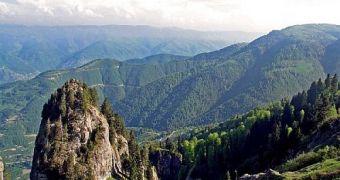Researchers from the University of Cambridge, have discovered an endangered language they were unaware of, and established a connection with Ancient Greek.
This is actually a unique Greek dialect that is spoken by merely 5,000 people in the north-eastern parts of Turkey, in the area around Trabzon, on Turkey's Black Sea coast.
Since it is so very close to previous forms of the Greek language, Romeyka (that is its name) is considered a 'linguistic goldmine', sharing certain features with the common Greek of 2,000 years ago.
Dr. Ioanna Sitaridou, a lecturer in Romance Philology at the University of Cambridge and Fellow and Director of Studies in Linguistics at Queens' College, Cambridge is responsible for the discovery of the connection between this dialect and ancient Greek.
Dr. Sitaridou's great-grandparents were from the region, and now, she is reporting the results of the first phase of her project of uncovering the secrets of this little-known dialect.
She first realized the importance of Romeyka, once Professor Peter Mackridge (Emeritus Professor of Modern Greek at the University of Oxford, carrying out pioneering research since the 1980s) told her that her work on Romance infinitives could have a parallel in Romeyka.
And he was right, because Romeyka had retained the infinitive – the basic, uninflected form of the verb, that was part of Ancient Greek, but disappeared from the medieval and modern language.
A special feature of Romeyka, is that it has developed some other strange infinitival constructions that have never been heard before.
As Dr. Sitaridou says in one of the videos presenting her research, she was unable to conduct this work at Cambridge, so she had to take field trips to isolated villages in Pontus, where Romeyka is spoken.
In order to learn as much as possible on Romeyka, and to map the grammatical structure and variations in use, the researchers gathered information on audio and video recordings of the stories that the villagers told, and also through specially-structured questionnaires, built with state-of-the-art modern linguistics.
“Although Romeyka can hardly be described as anything but a Modern Greek dialect, it preserves an impressive number of grammatical traits that add an Ancient Greek flavor to the dialect's structure - traits that have been completely lost from other Modern Greek varieties,” said Dr. Sitaridou.
“What these people are speaking is a variety of Greek far more archaic than other forms of Greek spoken today.”
The Black Sea, or Pontus Euxinus as the Greeks called it, laid at the heart of the Greek-speaking world, and that until medieval times.
The Greeks colonized it in the 8th and 7th centuries BC, and made a place for it in Greek mythology.
So maybe a good understanding of this endangered language, will manage to explain the way that Pontic Greek evolved.
Dr. Sitaridou is the recipient of a Stanley J. Seeger Visiting Research Fellowship in Hellenic Studies at Princeton University (Spring 2011), and she said that “we know that Greek has been continuously spoken in Pontus since ancient times and can surmise that its geographic isolation from the rest of the Greek-speaking world is an important factor in why the language is as it is.
"What we don't yet know is whether Romeyka emerged in exactly the same way as other Greek dialects, but later developed its own unique characteristics which just happen to resemble archaic Greek.
“On the other hand, it may have developed from an earlier version of Greek that was different to the rest of the Greek dialects, which in turn explains the archaic features."
It is rather amazing that in spite of 2,000 years passing by, this language is still spoken by people living in this remote region.
A possible explanation could be that Romeyka speakers are devout Muslims, and were therefore exempt from the large-scale population exchange between Greece and Turkey, in 1923, under the Treaty of Lausanne.
This treaty made religion a criterion for resettling Christians in Greece and Muslims in Turkey, so at that time, nearly two million people were forced to move.
This forced exodus of all Christian Greek-speakers from north-eastern Turkey, left the speakers of Romeyka relatively isolated from both Turkish and Pontic Greek.
Dr. Sitaridou pulls an alarm signal in her last report, saying that because of repeated waves of emigration from Trabzon, along with the influence of the dominant Turkish-speaking majority, this dialect has become vulnerable and if not protected, it could become extinct.
UNESCO has already designated Pontic Greek as "definitely endangered", so maybe, after further studies, Romeyka will be a protected language too.
“With as few as 5,000 speakers left in the area, before long Romeyka could be more of a heritage language than a living vernacular,” added Dr. Sitaridou.
“With its demise would go an unparalleled opportunity to unlock how the Greek language has evolved.”
The first findings are reported in the University's research magazine, Research Horizons.
Watch the video presenting the research so far:

 14 DAY TRIAL //
14 DAY TRIAL //